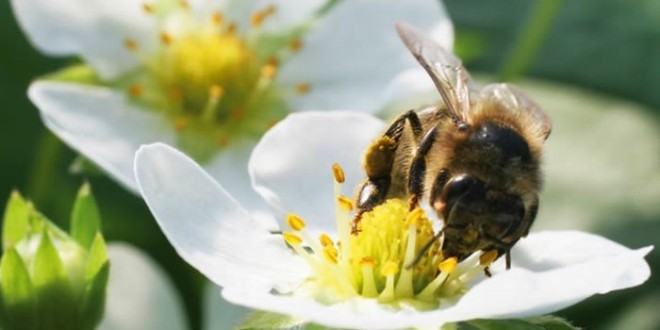Bumblebees exposed to even low levels of pesticides have trouble acquiring the pollination skills necessary to retrieve nectar from some wildflowers — especially those with complex shapes.
Scientists found bumblebees exposed to to neonicotinoid insecticide took longer to collect pollen and sought pollen from different flowers than control bees.
The study, published March 14 in Functional Ecology, is the first to explore how pesticides may impact the ability of bumblebees to forage from common wildflowers that have complex shapes such as white clover and bird’s foot trefoil.
Bees and other insects pollinate many of the world’s important food crops and wild plants, raising serious concerns about the impacts of reported global pollinator declines for food security and biodiversity.
The researchers found that bumblebees exposed to a realistic level of a neonicotinoid insecticide (thiamethoxam) collected more pollen but took longer to do so than control bees. Pesticide-exposed bees also chose to forage from a different flower in comparison to control bees.
“Bees rely on learning to locate flowers, track their profitability and work out how best to efficiently extract nectar and pollen,” said environmental sciences professor Nigel Raine, the Rebanks Family Chair in Pollinator Conservation at U of G and senior author of the paper.
“If exposure to low levels of pesticide affects their ability to learn, bees may struggle to collect food and impair the essential pollination services they provide to both crops and wild plants.”
Previous studies have found that exposure to neonicotinoid pesticides can cause changes in the brain, more specifically in the areas associated with learning and memory in honeybees.
In this new study, the researchers found that, while bumblebees exposed to pesticides collected more pollen than control bees, control bees were able to learn how to manipulate these complex flowers after fewer visits.
Lead author Dara Stanley, of Royal Holloway University of London, said, “Bumblebees exposed to pesticide initially foraged faster and collected more pollen. However unexposed (control) bees may be investing more time and energy in learning. Our findings have important implications for society and the economy as pollinating insects are vital to support agriculture and wild plant biodiversity.”
Raine said there is an increasing need for field-realistic research into the impact of all pesticides on bumblebees and other wild pollinators.
“Our results suggest that current levels of pesticide exposure could be significantly affecting how bees are interacting with wild plants, and impairing the crucial pollination services they provide that support healthy ecosystem function,” he said.
Agencies/Canadajournal

 Canada Journal – News of the World Articles and videos to bring you the biggest Canadian news stories from across the country every day
Canada Journal – News of the World Articles and videos to bring you the biggest Canadian news stories from across the country every day

